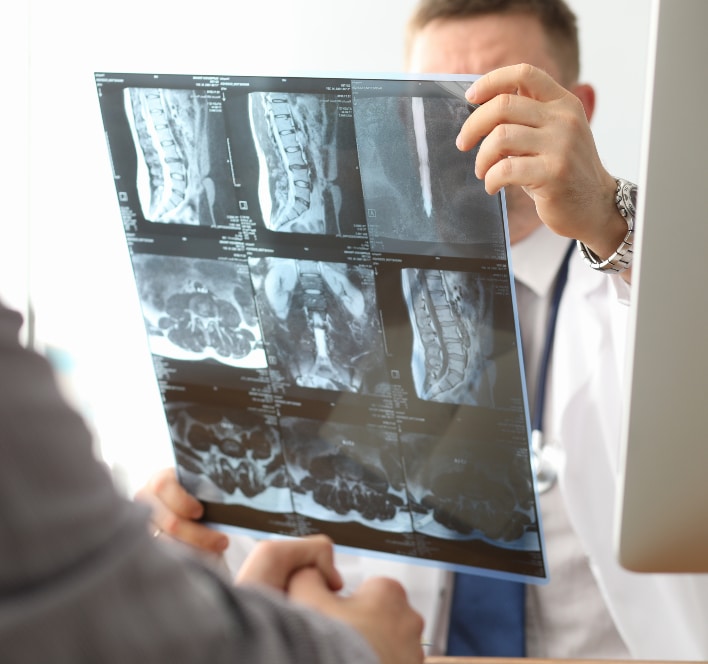Car accidents can cause various injuries, but they are most commonly associated with spinal injuries. Damage to the neck and back is expected after a crash, and you can sustain many different spinal injuries based on the type of car accident you experience. Whether the accident was minor or major, you are still susceptible to sustaining a lot of damage to your spine.
As a car accident victim, you should learn to recognize your symptoms to make it easier to diagnose your condition. There are many different types of spinal injuries. After a car accident, seeking medical treatment should be a priority. Talk to one of the spine specialists at NJ Spine and Orthopedics. At NJ Spine, we are staffed by leading members of our field who can use their years of experience to evaluate and treat your spinal injury.
Common types of Spinal Injuries
The spine is a large and complex section of the body. There are a variety of ways you can injure your spine, some of the most common listed below:
Cervical Vertebrae Injuries
The cervical vertebrae are the part of the spine found in the neck. Your seatbelt protects your upper body chest and keeps you restrained at the waist, but your neck and head are unrestrained. As a result, injuries to these areas are prevalent in car accidents. They are more common if your car is hit in the front or side or if you are ejected from your vehicle. They are rare if you are hit in the rear. They can vary in severity depending on where you’re hit.
Thoracic Vertebrae Injuries
The thoracic vertebrae extend through the upper and middle back and connect to the ribs and chest. These types of injuries can lead to permanent nerve damage. Injuries to the thoracic vertebrae are often the most serious. They can result in paralysis.
Lumbar Vertebrae Injuries
Located in the lower back, the lumbar vertebrae are the largest in the spine. After car accidents, your lower back can experience lumbar sprain and lumbar strain. Sprains occur when the ligaments that hold your bones together are torn from their attachments, and strain occurs when the impact causes the lumbar muscle to overstretch or tear. These injuries often result in limited ability to move.
Spinal Cord Injuries
After a car accident, you may experience a spinal cord injury. Spinal cord injuries vary in their level of severity. With a complete spinal cord injury, the sufferer has experienced a total loss of all motor and sensory functions below the injury site. Incomplete spinal injuries typically consist of varying degrees of partial motor and sensory function loss below the injury site.
Another spinal condition associated with car accidents is spinal stenosis, where the spinal column narrows. This narrowing of the spinal column can put pressure on the spinal cord and nerves, leading to various symptoms such as pain, numbness, and tingling. Because these symptoms are shared with other spine and neck injuries, it is essential to discuss them with a spine specialist.
The forceful movement of a car accident can cause discs to be displaced. Most herniated discs occur in the lower back, although they can also occur in the neck. Herniated discs are characterized by sudden intense pain or numbness.
Facet Joint Injuries
After a car accident, facet joint injuries can cause immediate pain. It can also lead to facet joint syndrome, a degenerative spinal condition. If left untreated, it can become disabling. In some cases, an injury to the cartilage that cushions the facet joints or a leak in the fluid that lubricates the joints can also develop.
Talk to the Spine Specialists at NJ Spine and Orthopedic
Spinal injuries sustained from car accidents can leave you in long-term pain and even lead to disability. Whenever you’re in an accident, it’s always best to seek medical treatment, no matter how minor the accident is. Car accidents are most commonly associated with spinal injuries, so give your body its best chance to recover by speaking to the spine specialists at NJ Spine and Orthopedic.
Our specialists are familiar with a wide variety of spine conditions and can give you the best medical care in the industry. They can evaluate you and guide you through your best treatment options. Our staff includes board-certified physicians and medical professionals who are experienced in numerous procedures to treat spinal injuries. Contact skilled spine specialists to ensure you’re getting the best care. Call (866) 272-9271 or use our contact form to make an appointment with one of our professionals.

